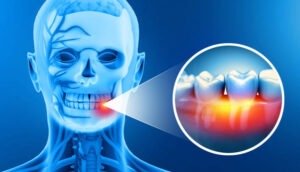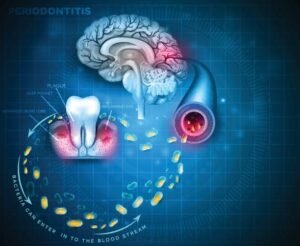Most people think of teeth only when they smile or eat. But did you know that your teeth and gums can actually give important clues about your overall health? Yes, your mouth is more than just a place to chew food—it’s the gateway to your body and often the first place where signs of illness show up.
Ignoring your oral health can lead to more than just cavities or bad breath. It can affect your heart, blood sugar, digestion, and even brain function. This blog explores how your teeth speak volumes about what’s happening inside your body and why you shouldn’t ignore the signs.
Your Mouth and Your Body: It’s All Connected

Your mouth isn’t separate from the rest of your body—it’s a key part of your health. Doctors call it the oral-systemic connection, which means that oral health and overall health go hand in hand.
Think about it. Every time you eat, drink, or breathe, you’re using your mouth. If bacteria are building up in your teeth or gums, they can easily travel through your bloodstream to other organs, causing inflammation and health complications. Gum infections, for example, can silently lead to serious issues elsewhere in the body.
Gum Disease and Heart Disease: A Dangerous Link

Bleeding gums or swollen gums might seem harmless at first, but they can be signs of a serious condition called periodontitis. This is an advanced gum infection that doesn’t just stop at the mouth—it can increase the risk of heart disease.
When bacteria from gum infections enter the bloodstream, they can cause inflammation in blood vessels, increase plaque buildup in arteries, and even lead to heart attacks. Several studies have shown that people with poor oral hygiene are at a higher risk of cardiovascular problems.
So yes, brushing your teeth properly can actually help protect your heart.
The Two-Way Relationship Between Diabetes and Dental Health

If you have diabetes or are at risk of it, you should pay extra attention to your dental health. Diabetes weakens your immune system, which makes it easier for bacteria in your gums to spread. At the same time, gum infections can make it harder to control your blood sugar levels, creating a vicious cycle.
People with uncontrolled diabetes often suffer from dry mouth, burning sensations, and loose teeth. Frequent gum problems could be an early warning sign that you have prediabetes or that your medication isn’t working properly.
Maintaining good oral hygiene can actually help manage diabetes better—and sometimes, dental symptoms show up before a medical diagnosis.
Chronic Bad Breath: More Than Just an Embarrassment

If your breath smells bad regularly, it’s not just a hygiene problem. Persistent bad breath (halitosis) can indicate deeper issues like digestive disorders, liver or kidney problems, sinus infections, or even diabetes.
In some cases, bad breath may result from tonsil stones or chronic inflammation in the mouth. If brushing, flossing, and using mouthwash don’t help, it’s time to see a dentist—and possibly a physician.
Your breath can literally tell you when something inside your body isn’t right.
Cavities Aren’t Just About Sugar

Most of us think that cavities are only caused by eating too much candy or not brushing enough. But the truth is, tooth decay can also be influenced by hormonal changes, medications, acid reflux, stress, and even autoimmune disorders.
In adults, cavities are becoming more common due to dry mouth caused by common medications like antihistamines, antidepressants, or blood pressure pills. Untreated cavities don’t just cause toothaches—they can lead to serious infections and inflammation that affect your whole body.
Getting a dental checkup twice a year can catch these problems early—before they affect your health on a deeper level.
Tooth Loss in Older Adults and Brain Health

If you’re older and losing teeth, it could be a warning sign beyond just age. Several studies show a link between tooth loss, gum disease, and cognitive decline, including Alzheimer’s and dementia.
Chronic inflammation in the mouth may lead to inflammation in the brain, which is connected to memory problems. In fact, researchers have found that people with severe gum disease have a higher chance of developing neurodegenerative conditions.
This makes oral care even more important as we age—not just to save teeth but to protect the mind.
Mouth Sores and Lesions: What They Might Mean

If you often get mouth ulcers, red or white patches, or any bumps that don’t heal in two weeks, they could be signs of a more serious health problem.
Sometimes, frequent mouth sores can be symptoms of nutrient deficiencies (like B12 or iron), immune disorders, gastrointestinal diseases like Crohn’s, or even oral cancer. Don’t wait and watch. Get them examined by a dentist or specialist immediately.
Your mouth is your body’s warning system. Listen to it.
Teeth Grinding (Bruxism) and Stress

Stress doesn’t just affect your mind—it can also show up in your teeth. Many people grind their teeth in their sleep without realizing it. This is known as bruxism, and it can lead to tooth damage, jaw pain, headaches, and even earaches.
If you’re under stress or anxiety, your jaw often becomes tense at night, leading to grinding. Dentists often see this in people who have tight schedules or high emotional stress.
Wearing a night guard, practicing mindfulness, and managing stress can help relieve both your mind and your jaw.
Dry Mouth and Your Medications
Saliva is more important than you think. It keeps your mouth clean, helps digest food, and protects your teeth. But many common medications—for blood pressure, allergies, depression, and even cancer—can reduce saliva production, causing chronic dry mouth.
A dry mouth can lead to cavities, bad breath, and oral infections. If you experience it regularly, talk to your doctor or dentist. They may adjust your medication or recommend treatments like saliva substitutes or hydrating mouthwashes.
How to Keep Your Mouth and Body Healthy

Oral health isn’t just about brushing twice a day. It’s a daily habit that reflects your commitment to your overall wellness. A balanced diet rich in vitamins, regular hydration, avoiding tobacco, and limiting sugar are just as important.
Make time for dental checkups every six months, even if you think everything is fine. Just like regular body checkups, your mouth needs professional care too. It’s better to prevent than to treat.
Your Mouth Doesn’t Lie
We often hear that “the eyes are the window to the soul”—but when it comes to your health, your mouth is the window to your body. From gum disease to diabetes, heart problems to digestive issues, many serious health conditions start showing signs in the mouth.
So the next time you feel something is “off” in your teeth, gums, or breath—don’t ignore it. It could be your body’s way of asking for help. Taking care of your mouth is not just about keeping your smile beautiful—it’s about keeping your body healthy, strong, and disease-free.
Lifestyle सम्बन्धी ऐसी और भी जानकारियों और खबरों के लिए हमारे साथ जुड़े रहें! Khabari bandhu पर पढ़ें देश-दुनिया की ताज़ा ख़बरें — एजुकेशन, मनोरंजन, बिज़नेस, धर्म, क्रिकेट, राशिफल और भी बहुत कुछ।
क्या शुगर वाकई स्वास्थ्य के लिए हानिकारक है? जानिए वैज्ञानिक सच्चाई
क्यों कुछ लोग मीठे के आदि हो जाते हैं? जानिए इसके पीछे की वैज्ञानिक वजहें
क्या नारियल पानी स्वास्थ्य के लिए फायदेमंद है? जानिए इसके 10 जबरदस्त लाभ

